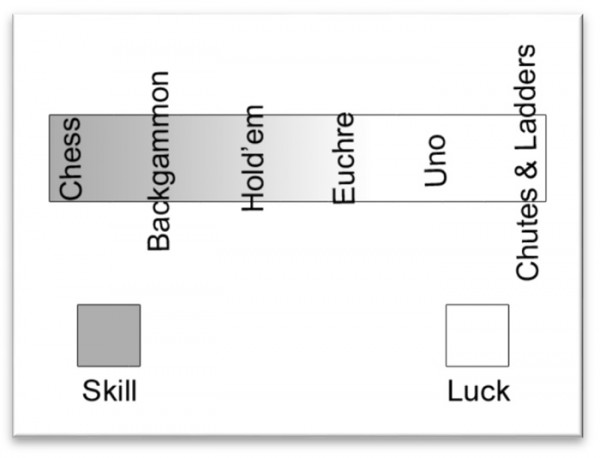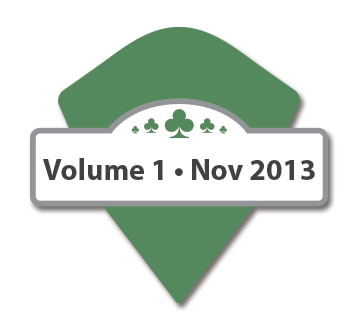Just a Game
- By Owen Gaines
- November 20, 2013
- Comments Off on Just a Game
“Hold’em is to stud what chess is to checkers.” – Johnny Moss
Early in 2005, I was just starting to make some decent money playing Hold’em. I was still learning a lot about the game and spending a ton of time studying it. I was eating and sleeping poker.
Then one night, I dreamt I played Monopoly for a living. “How strange,” I thought. The dream was an eye-opener. I awoke with an epiphany: Poker is just a game.
I guess I always had thought about poker differently since it’s generally played with real money; that set it apart in my mind. Poker was something else to me; something more spectacular than just a game. I was wrong.
Poker is just a game!
It’s a game just like Uno, Stratego, Euchre, Monopoly, Chutes and Ladders, and so many others. This seems ridiculously obvious, but I wasn’t thinking about poker as I thought about other games. But once I realized poker was just another game, I began drawing comparisons. As I did this, I started gaining the proper perspective about poker. This was the first real step toward developing a good mentality for dealing with mental beatings poker inflicts on its participants.
In Mason Malmouth’s Poker Essays, he talks about how Hold’em is a game where there is an interesting ratio of luck and skill. The more a random event impacts the outcome of a game, the greater the amount of luck in the luck-to-skill ratio. Mason argues the ratio in Hold’em is such there’s ample luck involved, which keeps a novice coming back because he’s winning from time to time (by getting lucky). Yet, there’s sufficient skill involved, which gives an informed player a significant advantage over the novice.
 Considering the luck-to-skill ratio in poker got me thinking about others games. If we visualize the luck-to- skill ratio on a continuum, we can think about where different games might be placed.
Considering the luck-to-skill ratio in poker got me thinking about others games. If we visualize the luck-to- skill ratio on a continuum, we can think about where different games might be placed.
The left side of the figure represents games of complete skill. Perhaps a game on this extreme side would be chess. The edge an informed player has in a game like this is enormous. The uninformed player has no hope of winning. Obviously, the expert would like to play this game for money as often as possible.
The right side of the figure will represent games in which only luck is present. There is no edge available to either player (whether they know it or not). Perhaps a game in which this is the case would be Chutes and Ladders. You can’t even lose on purpose.
Starting at the right side and moving left, a game like Uno has an extremely heavy luck element. The cards you are dealt and the cards you draw are all random. However, unlike Chutes and Ladders, some skill impacts the outcome of the game. This skill includes variables like how you play your wild cards and whether or not you say “Uno” when you have one card left.
More towards the middle of the continuum would be a game like Euchre. The cards dealt are again random, but how you play the cards and what you bid play a heavy role in the game’s outcome.
As we move further to the left, we may now put a game like Hold’em on the continuum. The cards dealt to each player and the board cards are random; however, the betting choices possess an enormous impact on the game’s conclusion.
Further yet to the left could be a game like Backgammon. The luck element is still present with the roll of the dice; however, the skill factors in the game are almost insurmountable over large samples.
Games also can be open or closed (or mixed). By a closed game, I mean one in which all components of the game are hidden. A game like this could be demonstrated if I were to hide a coin in one hand, close both my hands, and ask you to pick the fist enclosing the coin. There is nothing exposed in the game.
On the other side, chess would be an open game. All the pieces are exposed to each player. The presence of hidden aspects in a game lengthens the amount of time necessary for skill to overcome luck.
With the use of hole cards, Hold’em has a hidden component. However, this characteristic of a Hold’em game can oscillate. As we learn about our opponent’s static strategy (i.e., our hand-reading improves), the game becomes more open and the hidden nature of our opponent’s hole cards is reduced. This information allows us to use more skill and more quickly realize an advantage.
Examine the game you are playing. Uncover its character. Get in tune with the game’s composition. Then you can understand what to expect. When you resist the nature of the game, you set yourself up for disappointment and pain.
Disappointment and pain is not why we play a game. When you find yourself not having fun and/or experiencing some form of pain when you’re playing poker, think about why you’re feeling that way.
When you sit down at a poker table, you are submitting yourself to the game’s temperament. Are you expecting something from the game it doesn’t provide? If so, you’ll need change your thinking.
Understanding poker as a game helps us see it in proper perspective. Imagine someone making the following posts in a monopoly forum.
“They always land on Free Parking! What can I do?”
“I have my hotels set up, but they keep landing on the utilities instead of my property! What can I do?”
“I keep going to jail! What can I do?”
“They get all the good chance cards! What can I do?”
What can you do? The answer is nothing. That’s the luck side of the game. Now, would it make sense to get upset about that in the game of Monopoly and start mortgaging all your hotels and making stupid trades? Of course not!
Monopoly tilt!
Yet, we do that very thing in Hold’em when we get upset and start playing badly. People are going to suck out! That’s the luck element.
Perhaps if I were to take the analogy a bit further with Monopoly, I could make a version of the game like this. To begin the game, you randomly distribute the properties to the players (some people do this anyway to make the game go faster). Then, you look at your properties and decide if you want to play or not.
Some people may play no matter what properties they have – loose Monopoly players.
Some would wait until they had a couple Monopolies already, and then decide to play – tight Monopoly players.
Of course, with some Monopolies already in hand, you have a better chance to win. However, how you play the game after you get started is going to have a large impact on your results – postflop Monopoly.
There will be times when you start with five monopolies, but your opponent just gets lucky rolls and you lose anyway – Monopoly suck outs.
The skill level of your opponents will also determine how likely you are to win. If they start with any cards, that’s great. If they make stupid decisions in the game like making any trade you offer and never building houses, you’re going to have a significant edge. The worse they are compared to you, the greater chance you have of winning – Monopoly table selection.
I’m not sure where Monopoly and Hold’em actually compare in the luck-to-skill ratio, but this gets us thinking about our game in the right perspective.





